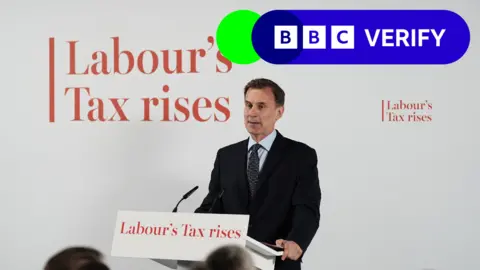Is Hunt right about a £38bn black hole?
 PA
PAChancellor Jeremy Hunt has unveiled a dossier adding up how much Labour's spending commitments would cost, with a claim that they would leave a £38.5bn black hole in government finances.
Labour, which has accused the Tories of their own spending black hole, has criticised the dossier, saying some of the policies cited are wrong and questioning some of the cost calculations.
Many of the 19 items on the Tory list of Labour's spending commitments involve relatively small amounts of money.
We've looked at the five biggest, which account for two-thirds of the money involved. Some are accurate, others are less reliable.
Green prosperity plan
The biggest Labour spending commitment identified by the Tories is the Green Prosperity Plan at £19bn over four years - about a third of total spending in the dossier.
That figure is correct. In February, Labour said its policies would involve a £23.7bn investment over the next parliament (five years) – which equates to £19bn over four years.
The dossier mentions other much higher figures, but eventually settles on this one.
Under Labour's green plan, it is pledging fully clean power by 2030, with the aim of cutting the UK’s greenhouse gas emissions and reducing energy bills.
Its policies include setting up Great British Energy – a publicly-owned company to invest in low carbon sources like offshore wind and nuclear – and a Warm Homes Plan to improve home insulation.
Insourcing
The next biggest commitment is insourcing, which the Conservatives say will cost £6.5bn over four years.
The idea of insourcing is to stop public services being provided by private companies and give them back to the state to carry out.
There is no question that Labour are enthusiastic about insourcing, but they have not given details of where and how quickly it would happen, so a lot of assumptions are needed to come up with this costing.
The calculation assumes that outsourced services are 7.5% more efficient than insourced ones, based on a report from the Institute for Government.
But what the report actually says is that while some outsourcing has led to greater efficiency, other attempts have resulted in "significant overspend, while a string of failures has damaged public trust".
The 7.5% figure is only mentioned once in the report, as the lower end of the savings from outsourcing cleaning services.
The government dossier actually warns about the use of the 7.5%: "We have low confidence in this because the difference between the cost of outsourcing and in-house delivery is highly circumstance specific."
Labour have criticised the involvement of Tory special advisers in reaching these costings because they are likely to be more political than other civil servants.
Double NHS scanners
Shadow health secretary Wes Streeting said in late 2023 that he wanted to double the number of CT and MRI scanners in the NHS.
The policy has been costed by the dossier at £6bn over four years.
There are various uncertainties in the costing, in particular that it has set out the costs of the policy but not any benefits in terms of greater efficiency in the NHS from having the latest equipment and the benefits of early diagnosis in terms of saving money on treatment.
On the other hand, they have not included the cost of hiring and training new staff to operate the scanners.
 PA
PABreakfast clubs
The provision of free breakfast clubs at primary schools is one of the things that Labour says would be funded by ending tax breaks for private schools.
It is not entirely clear whether the clubs will include free childcare as well as breakfast and the overall cost would depend on the take-up.
The £4.5bn that the Conservatives have scored it at assumes that both food and staffing would be paid for and that half of all pupils would take advantage of the service.
NHS appointments
Number five on the list is having two million more NHS appointments per year, which is costed at just under £4bn.
This measure was one of Labour's "first steps" announced on Thursday.
It is a pledge for Labour's first five years in office, although they have not said how long it would take them to provide the extra 40,000 appointments a week, so charging the full cost in the early years of the Parliament may not be accurate.
The dossier assumes the appointments would be more expensive than existing ones because they would be at evenings and weekends, which is in line with Labour policy.
Extra money raised
The dossier also looks at how much will be raised by some of the tax measures that Labour has announced, which involve considerable uncertainty.
On the value of charging VAT on private school fees, for example, it is assumed that 11% of pupils will be moved to state schools as a result of the policy.
The benefits of removing tax breaks from private schools depends on how many previously privately educated pupils end up having to be taught at taxpayers' expense.
Similarly, the amount raised from extending the windfall tax on energy companies depends on what happens to oil and gas prices.
We asked independent think tank the Institute for Fiscal Studies what they thought of the dossier and they told us they were waiting for the actual manifestos to be published before commenting on the totality of costs.
We've already looked at Labour claims of a £46bn black hole in Conservative plans.
Expect lots more discussion of spending black holes before we finally get to the election.


